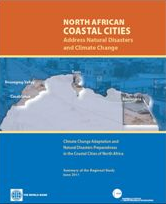The World Bank-led study, supported by the Global Facility for Disaster Risk Reduction and Recovery (GFDRR) and titled “Climate Change Adaptation and Natural Disasters Preparedness in the Coastal Cities of North Africa,” proposes measures to increase resilience to extreme weather events in Casablanca, Tunis and Alexandria.
 4 June 2011: The World Bank led a study on “Climate Change Adaptation and Natural Disasters Preparedness in the Coastal Cities of North Africa,” which estimates that the economic impacts of climate change in Alexandria, Casablanca and Tunis will be more than $1 billion each between now and 2030.
4 June 2011: The World Bank led a study on “Climate Change Adaptation and Natural Disasters Preparedness in the Coastal Cities of North Africa,” which estimates that the economic impacts of climate change in Alexandria, Casablanca and Tunis will be more than $1 billion each between now and 2030.
The study of North African cities’ vulnerability to climate change risks was carried out between June 2009 and June 2011 with financial support from the Global Facility for Disaster Risk Reduction and Recovery (GFDRR). Alexandria was found to require climate-smart urban planning to ensure its growing population does not settle in low-lying coastal areas, as well as early warning systems for natural disasters. The report indicates that climate-resilient urban planning, including drainage systems, will also be crucial for Tunis to manage the flooding risks. Casablanca, in turn, has a coastal segment that faces a strong risk of erosion and submersion, requiring upgraded systems for surveillance and early warning. [Publication: Climate Change Adaptation and Natural Disasters Preparedness in the Coastal Cities of North Africa]